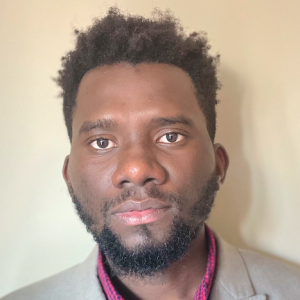Olukunle Owolabi
Talk Title: Power Outage Risk Interconnection: Relationship with Social and Environmental Critical Risk Indicators
Watch Olukunle’s Research Lightning Talk
Talk Abstract: The interconnections between diverse components in a system can provide profound insights on the health and risk states of the system as a whole. Highly interconnected systems tend to accumulate risks until a large, systemic crisis hits. For example, in the 2007-09 financial crisis, the interconnection of financial institutions heightened near the collapse, suggesting the system could no longer absorb risks. Extending concepts of interconnectedness and systemic risk to coupled human-natural systems, one might expect similar behaviours of risk accumulation and heightened connectivity, leading to potential system failures. The Predictive Risk Investigation System (PRISM) for Multi-layer Dynamic Interconnection Analysis aims to explore the complex interconnectedness and systemic risks in human-natural systems.
Applying the PRISM approach, we could uncover dynamic relationships and trends in climate resilience and preparedness using Energy, Environmental and Social indicators. This study proposes a case-study application of the PRISM approach to the State of Massachusetts using a dataset of over 130000 power outages in the state from 2013-2018. Random Forest, Locally Weighted Scatterplot Smoothing (LOWESS) and Generalized Additive Models (GAMS) are applied to understand the interconnections between Power outages, Population density and Environmental factors (Weather indicators e.g. Wind Speed, Precipitation).
Bio: I am a Data Scientist with domain expertise in Energy – Oil, Gas, Renewables and Power Systems. With a BS in Petroleum Engineering and an MS in Sustainable Energy Systems, I have always enjoyed a data-centric approach in solving interdisciplinary problems. In my Bachelor’s degree, I used Neural Networks to solve a practical oil-field (Production Engineering) problem. In my master’s I explored potentials for optimizing clean-energy microgrids in low-income, underserved communities while leveraging insights from large, messy, unstructured data. In my PhD at Tufts I am working in an interdisciplinary team of Data and Domain Scientists where I am applying Data Science/Machine Learning Techniques and Tools to Energy, Climate, Financial, and Ecological systems. One word to describe my experience is diversity. I am fortunate to have enjoyed a fair share of diversity in my academic and professional experience – in geography and in scope. An experience that traverses three continents of the world equipped with a broader scientific and engineering background. This exemplifies my interest in complex, interdisciplinary and multifaceted problems traversing various fields such as: science, engineering and data science. I am enthusiastic about applying my knowledge and skills in Data Science to new, challenging, unfamiliar terrains to discover and garner insights and solve problems that improves experience and affects people, communities, and organizations.
